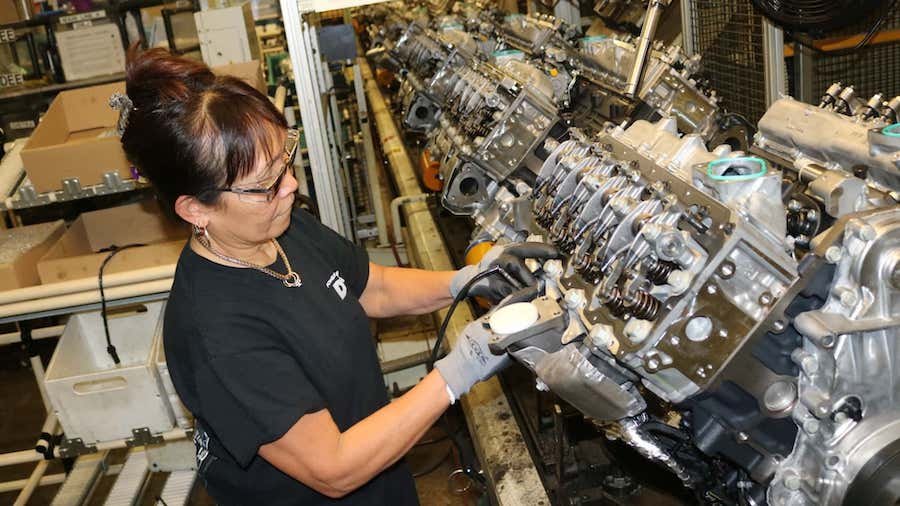Tariffs Have Arrived. Here's How Automakers Are Reacting

Update: Added a statement from the Alliance for Automotive Innovation.
The 30-day moratorium is over. The Trump Administration followed through on a 25-percent tariff for all imported goods from Canada and Mexico, effectively blowing up decades of trade between the North American countries over claims that "unchecked drug trafficking" poses a threat to U.S. national security.
The auto industry could take the hardest hit in this action. As the Detroit Free Press pointed out, new product plans for automobiles generally involve a five-year cycle. That makes it virtually impossible for automakers and suppliers to quickly adapt to major changes. In the short term, it means everything auto-related will likely get more expensive. That includes new vehicle prices, parts for used vehicles, and even auto insurance as repair costs go up.
With the future still most decidedly uncertain, how are automakers responding to the tariffs? We reached out to the Detroit Three—Ford, General Motors, and Stellantis—for their take on the situation. We also contacted Toyota, Honda, Hyundai, Volkswagen, and BMW, all of which have at least one manufacturing facility in the United States.
General Motors and Stellantis don't have company-specific responses, but both support the official statement from the American Automotive Policy Council (AAPC), which represents Detroit automakers.
"We continue to believe that vehicles and parts that meet the USMCA’s stringent domestic and regional content requirements should be exempt from the tariff increase," said AAPC President Matt Blunt. "Our American automakers, who invested billions in the U.S. to meet these requirements, should not have their competitiveness undermined by tariffs that will raise the cost of building vehicles in the United States and stymie investment in the American workforce, while our competitors from outside of North America benefit from easy access to our home market.”
Ford did not immediately respond when reached for a statement, but we already have a taste of the company's take on big tariffs. CEO Jim Farley said tariffs would mean higher prices for customers, but he also cautioned that they would "have a huge impact on our industry, with billions of dollars of industry profit wiped out, and adverse effects on US jobs as well as the entire value system in our industry."
Outside the Motor City, Hyundai has multiple factories and facilities in the United States. As of late, the Korea-based company has touted its investments in the US.
"So, the best way for us to navigate tariffs is to increase localization," said Hyundai Global CEO Jose Munoz. "We decided to invest big time in America as the most important market."
Hyundai's official statement, however, is non-committal on how tariffs might affect the company. It's worth noting that, at this time, there is no 25-percent tariff for goods imported from South Korea.
"For nearly four decades, Hyundai has been a driver of American growth and innovation, contributing jobs, economic activity, and investments that have helped Americans prosper. Since entering the United States, Hyundai Motor Group has invested $20.5 billion in the U.S., creating and supporting more than 570,000 American jobs. This includes the Hyundai Motor Group Metaplant America (HMGMA) site in Bryan County, Georgia, the largest economic development project in Georgia’s history, which will have the capacity to produce 300,000 vehicles for the American market annually.
We are closely monitoring new U.S. policy developments and reviewing various business strategies."
BMW declined to comment specifically on the situation, but did offer the following statement:
"Free trade, which has always been a guiding principle for the BMW Group, is of immense importance worldwide: It is one of the most crucial drivers of growth and progress. Tariffs, on the other hand, hinder free trade, slow down innovation, and set a negative spiral in motion. In the end, they are detrimental to customers, making products more expensive and less innovative."
Honda declined to comment directly but referred us to the Alliance for Automotive Innovation (AAI), which responded with the following statement from AAI President and CEO John Bozzella:
“We’ve had seamless automotive trade in North America for more than 25 years. Parts, components and vehicles regularly flow back and forth across the border— multiple times before becoming a finished vehicle. This trade supports U.S. auto industry jobs as well as vehicle choice and vehicle affordability in America.
“This isn’t hypothetical. All automakers will be impacted by these tariffs on Canada and Mexico. Most anticipate the price of some vehicle models will increase—by as much as 25 percent—and the negative impact on vehicle price and vehicle availability will be felt almost immediately.
“Automakers, battery makers, and suppliers are investing billions in American manufacturing and to modernize the industrial base. But it’s worth remembering the sheer scale of the industry and the size of these automotive and advanced manufacturing facilities. They’re massive. You just can’t relocate automotive production and the supply chain overnight. That’s the challenge and the dilemma: auto tariffs in North America could end up increasing costs on consumers before jobs come back to the country.
“President Trump understands the importance of a healthy and globally competitive auto industry. He’s stressed his commitment to the industry and auto workers during the campaign and since the inauguration. We look forward to working with the administration on solutions that achieve the president’s goals, keep the industry competitive and in a position to support the country’s economic and national security in the years ahead.”
Toyota, which has numerous factories in the US, declined to comment.
Related News
